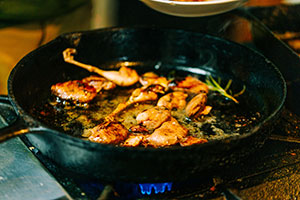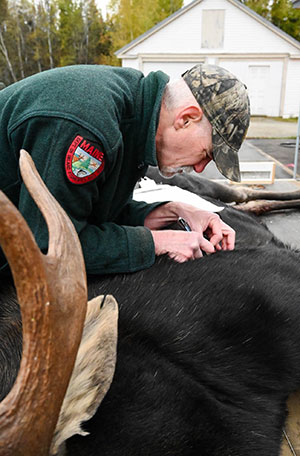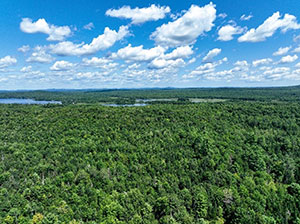Home → Hunting & Trapping → Hunting → Benefits of Hunting
The Benefits of Hunting: Supporting Wildlife, Conservation, and Community

The benefits of hunting extend beyond hunters themselves – hunting supports healthy wildlife populations and ecosystems, funds wildlife conservation for a variety of species (including nongame and endangered species), helps protect and conserve vital habitats, strengthens bonds with friends and family, and boosts Maine's economy.
There are certainly easier ways to put protein on the dinner table, but hunters, motivated by more than a meal, rise to the challenge. Their dedication to exploration and understanding of Maine's wildest places and wildlife populations earns hunters a deep connection to nature, lifechanging memories, and the honor of helping to protect natural resources for future generations.
Sustainable, local food sources

Hunters go beyond farmers markets to source local food directly from Maine's forests. By learning about the species and habitats, hunters secure healthy, free-range, lean protein. In 2024 alone, over 42,000 deer were harvested in Maine. With an average meat yield of 58 pounds per deer that is over 2 million pounds of lean healthy protein on the plate. Hunters take pride in the work that goes into harvesting their own food, the knowledge of where their food comes from, and that regulated hunting maintains healthy wildlife populations and ecosystems.
In addition to feeding their own families, each year hunters give hundreds of pounds of protein to Mainers in need through the Hunters for the Hungry program.
Healthy wildlife populations

Wildlife populations cannot increase indefinitely. When populations get too numerous for the environment to support them, they become more prone to starvation (due to limited food sources), to outbreaks of diseases, and may become physiologically stressed and less apt to produce healthy offspring. They can also start to damage their habitat, negatively impacting other species. This can also lead to an increase in negative interactions with people. Hunting helps keep wildlife populations at levels that their surrounding environment can support.
Hunting also provides wildlife biologists with critical harvest information and biological data collected at registration stations, which is used for species management, population monitoring, and disease prevention.
For example, ovaries collected from cow moose provide biologists with insights into cow productivity in the region (how many moose are being born each year), twinning rates, and age of first reproduction. This insight, paired with other harvest, research, and monitoring data, helps biologists evaluate the physical condition of the herd, determine if the population is growing, declining, or stable, whether the habitat can support the size of the herd, and how winter ticks are impacting pregnant adult female moose.
Teeth are collected from harvested moose, bear, deer, and many furbearers. When evaluated, a tooth provides information on the age of the individual and insight on age structure of the population.
Funding for wildlife conservation

Every time a hunter purchases a license, permit, or certain hunting equipment, a portion of that sale goes directly to wildlife conservation.
In 1937 the Pittman-Robertson (PR) Act was passed to match State funds, such as hunting license and permit funds, with federal dollars for wildlife management in each state. These PR funds are generated through a manufacturer-paid excise tax on archery equipment, firearms, and ammunition. In 2024, Maine received nearly 11 million dollars of PR funding to help manage wildlife and enhance habitats, including implementing management programs for game species (species that are hunted) like white-tailed deer, moose, and black bear as well as non-game species (species that are not hunted) such as the Canada lynx, New England cottontail, and hundreds of resident and migratory birds. PR funding also helps support hunter education and the shooting range program.

For every $1.00 that Maine puts into management for wild mammals and birds and outdoor access we can receive $3.00 more from federal PR funds.
And in case you needed another reason to purchase a Maine hunting license…. The more hunting licenses sold, the more federal funding we are eligible to receive. Thanks, hunters! Learn more about how federal PR funds support fish and wildlife management.
Protected and enhanced habitat for wildlife and public access for outdoor recreation

Hunters also help fund land acquisition – protecting important wildlife habitat for hundreds of species.
Habitat protection and securing public access opportunities are the most permanent activities MDIFW undertakes to implement its mission of protecting and managing Maine's fish and wildlife and their habitats, promoting Maine's outdoor heritage, and safely connecting people with nature through responsible recreation, sport, and science.
Pittman-Robertson Act funds, revenue from Maine hunting license and permit sales, along with other funding sources such as Lands for Maine's Future and the Maine Outdoor Heritage Fund, and generous private donors have helped MDIFW acquire and manage wildlife habitat and public access on approximately 136,000 acres of State-owned Wildlife Management Areas (WMA) distributed across the State. WMAs preserve, protect, and enhance fish and wildlife habitat and provide outdoor recreation opportunities for the public. Some of the funding for WMA acquisitions comes directly from specific hunting permits, such as antlerless deer and migratory waterfowl (duck) hunting permits.

Since 2022, $12 from each antlerless deer hunting permit is deposited into the Maine Deer Management Fund, with the $2 agent fee covering administrative costs. These funds have helped acquire and manage over 10,000 acres of critical deer wintering habitat in Maine!
All revenue from the sale of state waterfowl permits is used exclusively for acquisition of waterfowl habitat and management activities. In the past few years, waterfowl hunting permit funds have helped MDIFW add additional parcels containing waterfowl and wetland habitat to WMAs in Prospect, Woodland, Georgetown, Bowdoinham, and Augusta, Maine.
So, the next time you buy, or see a hunter buy, another arrow, firearm, or more ammunition, remember – some of that money will be coming to a WMA near you-where you can hunt, wildlife watch, and explore, and where wildlife will live for generations to come.
Outdoor memories with family and friends + improved health and well-being

Not all Mainers participate in hunting, but for 200,000 people, hunting is a gateway to the outdoors and a way for both kids and adults to connect with the natural world. Hunting and other outdoor pursuits bring family and friends together to create lasting memories, and studies show that spending time outside supports better mental health, physical fitness, and overall well-being.
After all, people protect what they love. The more people who deeply care about our wildlife and wild places, the more people who will make choices to help them thrive.
Economic boost
In addition to the meals provided for Maine families, hunting provides important economic benefits throughout the state. Hunting in Maine has an economic impact of over $338 million and supports over 3,400 jobs. Outdoor pursuit related employment opportunities are shared across many sectors of the Maine economy including sporting goods, transportation, and accommodations. These income benefits are particularly important in rural or remote areas of the state, where the majority of outdoor pursuits like hunting, trapping, and angling takes place.
Hunters have long been a part of Maine's conservation history and will continue have a unique role in Maine's conservation future. Though their role is distinct, hunters share many of the same values, passions, and favorite pastimes as hikers, birders, anglers, campers, trappers, paddlers, wildlife watchers, and more, and share in the common goal to protect Maine's wildlife and wild places.
Learn more
- Learn more about hunting
- To learn more about wildlife conservation and management in Maine, read the Research and Management Report
- Learn how regulated trapping helps keep wildlife healthy
- View species management plans
- Learn more about Maine's shooting range program
- Get started on your conservation journey by taking a hunter safety and education course.
- Purchase a hunting license or permit online.